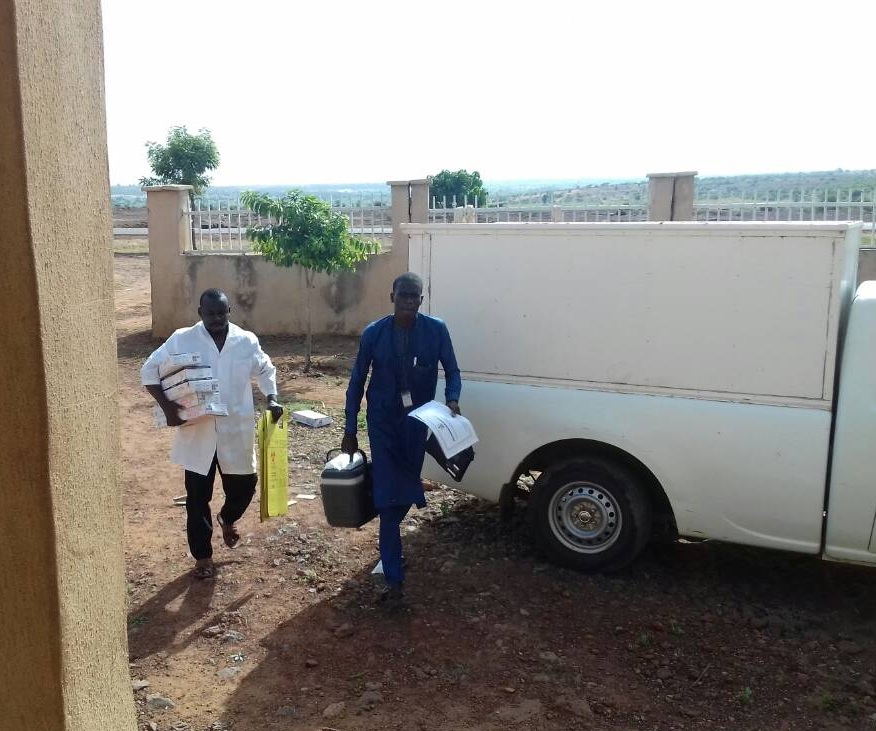By Adamu Lawan and Emerald Awa- Agwu
eHealth Africa's third- party logistics service, VDD ensures that vaccines are delivered to last mile health facilities in a timely manner
Vaccination is one of public health’s most cost-effective interventions. According to the World Health Organization1, it prevents between 2 million to 3 million deaths every year. Even though there has been great progress towards achieving universal coverage, there are still 20 million unvaccinated and under-vaccinated children worldwide. To reach these children and to meet global disease elimination targets, all countries must provide an uninterrupted supply of potent vaccines to the most hard-to-reach and conflict-affected areas.
Nigeria has experienced challenges in maintaining functional vaccine cold chains and supply chains, leading to low vaccination coverage rates. Nigeria’s cold chain system consists of five levels: a national cold store which stores all vaccines in the country and supplies six zonal cold stores located in each of Nigeria’s six geopolitical zones. The zonal stores supply vaccines to the state cold stores, which in turn supply the LGA cold stores. The primary health care facilities staff have to visit the LGA cold stores to collect their vaccines on a weekly or daily basis depending on the status of their cold chain equipment.
This system was inefficient and time- consuming because health workers from over 9,000 health facilities in Nigeria often had to leave work to collect vaccines when they could be treating patients instead. In addition, the system was fraught with high operational costs and poor vaccine stock visibility, especially in transit.
To alleviate this problem, the Nigerian government adopted a direct delivery model called Push Plus in 2013, to transform its supply chain at the state level. A direct delivery model is one which delivers vaccines and dry goods directly from the state cold store to the last mile health facilities according to customized schedules, bypassing the LGA warehouses completely and preventing stock-outs.
The benefits of this model have been enormous. The direct delivery model has freed up an additional 1- 6 hours each week for health workers to attend to patients—time previously spent by health workers in transit to obtain vaccines. In addition, vaccine availability at the last mile health facilities has improved. By increasing the number of health facilities that have functional cold chain equipment, health posts and smaller health facilities can receive vaccines from closer health facilities instead of going to the LGA cold store every day. This has led to a massive drop in the stock-out rate. In Kano state, vaccine stock-out rates dropped from 93% to 3% and in Lagos State, from 43% to none. Not surprisingly, the immunization coverage of Lagos State increased from 57% to 88%. WHO2 lists vaccine shortages and stock-outs as a major cause of missed opportunities to vaccinate.
Nigeria is projected to spend about US$ 450 million by 2020 on vaccines, By increasing vaccine accountability and visibility, the direct delivery model has also reduced the amount of money that could be lost due to wastage and pilfering of vaccines.
eHealth Africa implemented Vaccine Direct Delivery, a third-party logistics service based on the direct delivery model in Kano State from 2014 to 2016 and currently implements it in Bauchi and Sokoto states. We work with the state primary healthcare development agencies to ensure that vaccines and dry goods are delivered safely and in a timely manner to health facilities. Using our LoMIS Deliver solution, eHA plans, schedules, and routes deliveries to enable health delivery officers choose the correct quantity of vaccines and dry goods from the state cold stores and deliver them to health facilities equipped with cold chain equipment. The process of determining what quantities to deliver at the health facility is fully automated to avoid manual errors. The project also incorporates reverse logistics—returning balance stock or waste, if any to the state cold store. VDD provides governments and other stakeholders with accurate, near real-time data for decision making and forecasting.
Through VDD, over 28 million doses of vaccines have been delivered to health facilities in Kano, Bauchi and Sokoto State from 2014 to date, reaching over 13 million children under the age of one. eHealth Africa continues to support governments across Africa with system-level approaches to transforming health service delivery.


